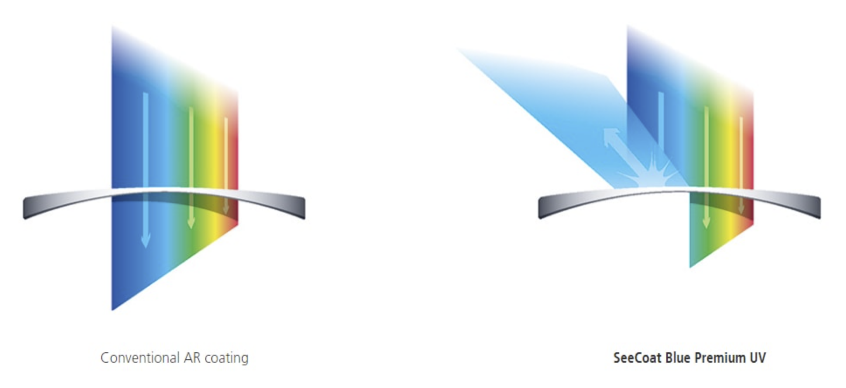Protecting your eyes from the potential harms of blue light

Protecting your eyes from the potential harms of blue light
As opticians, we are regularly asked about the potential harms of prolonged exposure to blue light. Blue light is a type of light that is part of the visible light spectrum, emitted by electronic devices such as smartphones, tablets, and computers. While blue light is necessary for regulating our circadian rhythm, extended exposure can harm our eyes and disrupt sleep patterns. Prolonged exposure to blue light is associated with damage to the retina and an increased risk of developing age-related macular degeneration. The retina is the part of the eye that converts light into the electrical signals transmitted to the brain. Damage to the retina can lead to permanent vision loss. Blue light can also disrupt natural sleep patterns, leading to insomnia and other sleep-related issues. So, how can you reduce your exposure to blue light? There are several ways to do this:
> Use a blue light filter: Many smartphones, tablets, and computers have built-in blue light filters, available in the settings area. These filters reduce the amount of blue light emitted from the screen. On an iPhone, the blue light filter is called ‘night shift'.
> Use blue light blocking glasses: These glasses have special lenses that block or filter out blue light and can be worn during the day or at night to reduce exposure to blue light from electronic screens.
> Take breaks and look away from the screen: Taking regular screen breaks and looking away from the screen every 20 minutes can help reduce eye strain and fatigue caused by prolonged exposure to blue light.
> Use an app: Several apps are available to help reduce blue light exposure by adjusting the colour temperature of screens to a warmer, more amber hue.
> Dim the screen: Lowering the brightness of your screen can also reduce the amount of blue light exposure.
> Change the time you use electronic devices: Try to avoid using electronic devices for at least an hour before bedtime to avoid disrupting your natural sleep patterns.
As independent opticians we recommend our patients use blue light blocking glasses with special coatings such as Nikon's SeeCoat Blue, a proprietary technology from Nikon. This coating is applied to lenses to help block blue light, reduce glare and help enhance colour contrast, making it easier to see in different lighting conditions.
It is worth noting that not all blue light blocking products are created equal. Some options can appear to have a yellow appearance for example and may not be aesthetically pleasing. Check the product specifications and be aware of any potential risks associated with use. Also, we recommend consultation with an optician before using any blue light filtering or blocking products.
In conclusion, reducing exposure to blue light will protect your eyes and improve your overall health. You can achieve this by using a blue light filter, wearing blue-light blocking glasses, taking regular breaks, using apps, dimming the screen, and avoiding electronic devices for at least an hour before bedtime.
